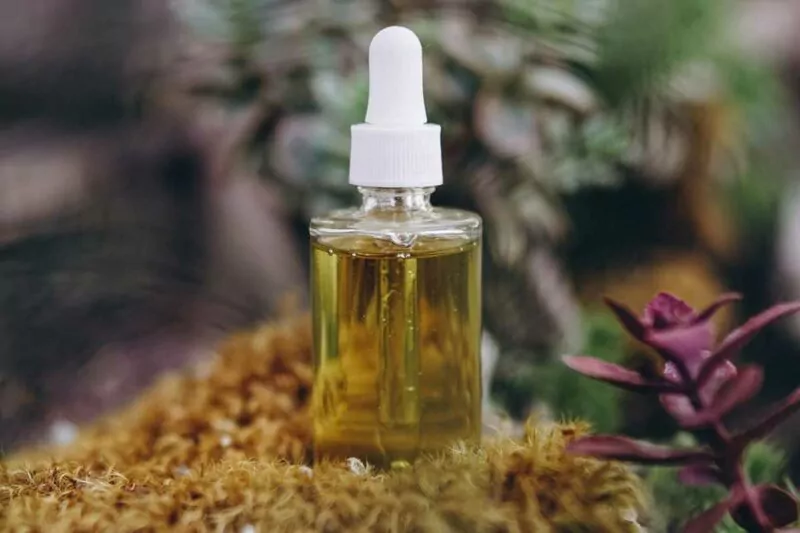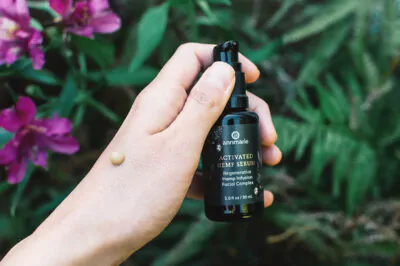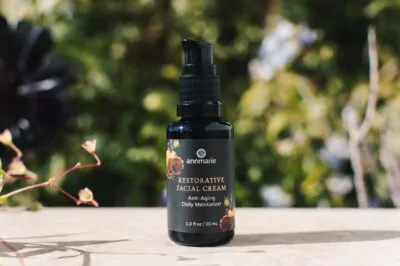Table of Contents[Hide][Show]
Vitamin C has become a prevalent ingredient in most facial products, and you might wonder, “what does vitamin C do for the skin?” When absorbed into the body through ingestion, there are many benefits of vitamin C. But when it comes to your skin, the only way to ensure you get its maximum benefits is to use it topically.
If you have wondered, “can vitamin C improve skin?” then you are in the right place. Here, we will cover all the dos and don’ts of this famous skin care ingredient; and after reading this, we hope you’ll see vitamin C’s amazing benefits for skin care and consider adding it to your daily routine.
What is Vitamin C?
Vitamin C is a naturally powerful antioxidant found in fruits and vegetables. It is an essential nutrient the body uses to grow and repair tissue in all body parts. When it comes to skin care products, vitamin C is produced using natural or synthetically derived ingredients that are added to body oils, serums and other skin care products. When applied topically, vitamin C helps protect the skin against environmental stressors.
Types of vitamin C

The efficacy of vitamin C, when used topically, varies on the type of vitamin C in the product. Vitamin C comes in different forms, and the skin can’t convert all vitamin C derivatives into active vitamin C. Only certain types of vitamin C can benefit the skin. It is also important to look at the quality of the vitamin C used and its short-term and long-term impact on the skin to determine which is the best for you.
L-ascorbic acid
This synthetic vitamin C is a potent and refined version of the vitamin. L-ascorbic acid has antioxidants that benefit the skin by neutralizing the impact of environmental stressors and reducing the signs of skin aging. While L-ascorbic acid can help the skin, it can only penetrate when formulated under low pH levels, neutralizing any charged molecules. When pure vitamin C isn’t prepared correctly, it can be unstable and degrade when mixed with skin care products. L-ascorbic acid can linger on the skin for up to 72 hours. The downside of this form of vitamin C is that it can cause skin irritation (especially for those with skin sensitivities) due to its need to be at such a low pH for stability.
Ascorbyl palmitate
This synthetic form of vitamin C is fat-soluble, unlike L-ascorbic, which is water-soluble. It comes in a creamy consistency and offers antioxidative skin protection and rejuvenation, benefiting the skin by brightening it. It is stable and converts into vitamin C when applied to the skin. However, studies have found that despite its antioxidant properties, it can also potentially intensify skin damage due to UV radiation (1).
Tetrahexyldecyl ascorbate
This is an oil-based form of vitamin C. Tetrahexyldecyl ascorbate is extremely stable and sinks into the dermis and epidermis, which is why we use it in our Concentrated Boosting Elixirs. It has wonderful brightening, antioxidant properties and its pH is safe for use on the skin—as it is the most non-irritating form of vitamin C currently on the market. It is powerful and shouldn’t exceed 1% when applied to the skin.
Vitamin C with bioflavonoids
Bioflavonoids are compounds mainly found in fruits and vegetables. They are good at transporting and enhancing the benefits of other antioxidants like vitamin C. When vitamin C and bioflavonoids are added together, it enhances its effects on the skin and slows down the decomposition of vitamin C.
Is a Vitamin C Serum Good for Skin?
If you are still wondering, “is a vitamin C serum good for skin?” The answer is yes, it is! But we always recommend looking at the source, type and how you are using vitamin C serum to see if it best serves your needs in the short and long run.
If you are searching for a high-quality vitamin C serum, look no further than our collection of serums and elixirs, featuring vitamin C in serums and products like our energizing Citrus Stem Cell Serum, rejuvenating Wild Fruit Serum and Brighten from the Concentrated Boosting Elixir trio. The high hydration content of these serum and elixir products will help deliver this powerful ingredient of vitamin C into the deep layers of the skin more than a moisturizer or facial oil can typically reach, so it is a great item to incorporate into your skin care routine for effective results. If you don’t currently own a serum and love DIY projects, check out our detailed guide on how to make a vitamin C serum at home! Or if you’re looking for a full overview on this topic, check out this article that covers everything you need to know about vitamin C serums.
7 Benefits of Vitamin C for Your Skin

Are you wondering what vitamin C does for the skin? Or maybe, you’ve tested various vitamin C products but still don’t know exactly how it helps your complexion. Below, we list some of the major vitamin C benefits for skin.
1. Hydrates skin
Vitamin C serums hydrate skin properly, helping you achieve a plump, supple look. In serum form, due to its high aqueous content, a vitamin C product will help allow your skin to retain more water, making it vibrant, bouncy-looking and youthful. Due to how vitamin C aids in water retention, it’s a common ingredient in anti-aging skin care, like our Restore Collection For Dry & Mature Skin.
2. Reduces the appearance of redness
Vitamin C can also help unclog pores leaving your skin feeling smooth. It soothes temporary redness (which may arise from skin picking or issues derived from congested pores) for an even complexion.
Looking for next-level results? Read more about how to combine vitamin C and niacinamide for reducing the look of temporary redness on your skin.
3. Vitamin C plumps up the skin
Because vitamin C is so hydrating, it replenishes water into the skin to create a plump look, leaving you with supple, youthful skin.
4. Protection
When you have dry skin, it tends to be easily compromised by the sun because it lacks hydration. Using vitamin C will provide the skin not only with a boost of hydration but also a healthy dose of antioxidants, fortifying the skin’s natural defenses—especially for when you are outdoors or exposed to the sun. But don’t forget your sunscreen in the morning for an extra shielding layer!
5. Brightens the skin
Vitamin C brightens the skin—reducing the appearance of dark spots and dullness—and gives it a youthful glow. Studies support this as vitamin C has been shown to impede excess melanin production, which is notorious for causing color on the skin (2).
6. Fades the appearance of dark spots
Dark spots occur when melanin is overproduced in some areas of the skin. Vitamin C inhibits melanin synthesis, which leads to the fading appearance of those dark spots for an illuminated, even-toned complexion.
7. It is safe for most skin types
Vitamin C is among the few topically used products that don’t cause adverse reactions on the skin. Most skin types can use it for an extended period without any adverse reactions. Be sure to find the one that best suits your skin type!
Conclusion
Vitamin C is a great ingredient to include in your skin care. As you have read above, there are so many benefits of vitamin C—making your skin look plumper and younger while reducing the appearance of fine lines and dark spots. If you have stubborn skin issues you’ve had trouble finding solutions for, add vitamin C to your skin care routine! It is a versatile product that can tackle many skin concerns, making it great for combatting your biggest skin hurdle while providing your skin with so many other benefits.
Looking for next-level results? Read about how to combine vitamin C and a retinol-alternative for supreme anti-aging benefits.
Frequently Ask Questions
Is vitamin C good for evening skin appearance?
Vitamin C can help minimize the appearance of dark spots to promote healthy looking skin and a more even tone.
Does vitamin C fade the look of dark spots?
Yes, it can. Vitamin C is one of the best ingredients for brightening the skin, which helps fade out the appearance of dark spots and illuminates your complexion.
Is vitamin C good for open pores?
Vitamin C helps thicken the walls of pores, decreasing their visibility and reducing the appearance of pore size.
Does vitamin C clog pores?
If you overuse vitamin C, it could irritate the skin, leading to clogged pores. If you are using a vitamin C serum, only use it twice a day: morning and evening.








Leave a Reply